The pacifier is the accessory that has been a timeless companion for babies everywhere. It comforts the baby and keeps them quiet. It’s a good solution for helping the baby fall asleep, and parents everywhere should have them.
However, you may wonder if the pacifier is safe for a sleeping newborn. You may wonder if it’s possible to choke on it or to stop breathing because of it. So, is the pacifier safe?
Yes! Pacifiers are good for any age of the baby, and they can be used for naps, bedtime usage, and fort general use.
The important thing is that you get a pacifier that is made for a newborn, or whatever age range your child is in. This can help ensure safety.
There are also many other benefits for sleeping with a pacifier that you may not have known of.
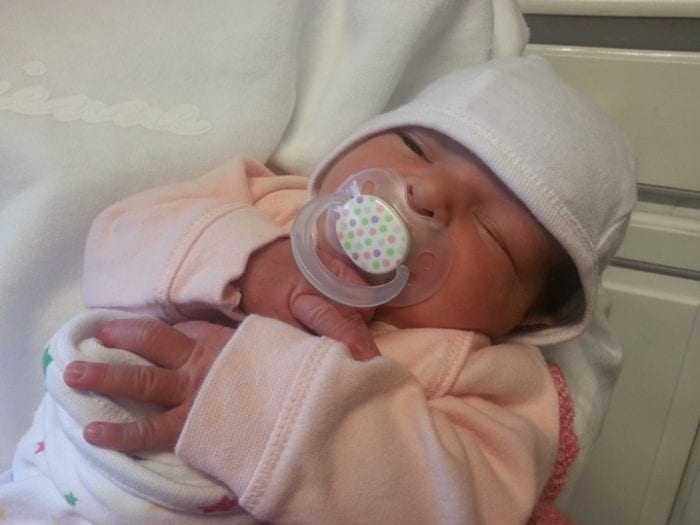
The Benefits Of Pacifier Sleeping
Not only is a pacifier safe, but it has many benefits as well, making it great for your little one. Here are a few of them.
It Calms Them Down
That’s perhaps the most famous reason. It’s in the name. Pacifier. Pacify. It’s designed to be a way to keep the baby calm. Sucking on a pacifier can help calm them down, reminding them of their mother or their baby bottle. This is a great way for your child to wind down after a long day of fun (read further here: https://www.healthline.com/health/parenting/newborn-pacifier).
Does It Help The Baby Sleep Longer?
You may wonder if a pacifier can help a baby sleep longer. There isn’t really any evidence to prove that. It seems like a baby will sleep just as long as they would without one. However, a pacifier can help the baby fall asleep quicker, giving them a more restful sleep they need.
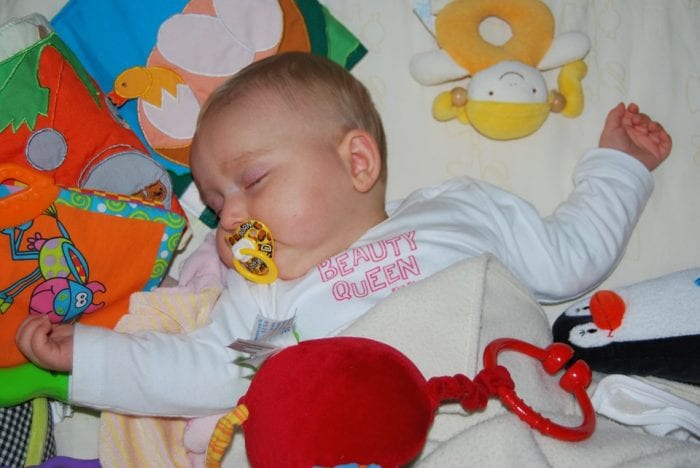
It Can Help Reduce SIDS
SIDS, or sudden infant death syndrome, is something that many parents fear. The idea of a perfectly healthy baby dying for no good reason happens quite often. However, there are many steps and precautions a parent can take to reduce the risk of SIDS.
One of those steps is getting them a pacifier. Why does a pacifier help? There is no exact answer. Perhaps the calming nature helps prevent the baby from too much distress. However, it can help, so not only is it safe, but it may be a lifesaver.
With that said, the pacifier should not be attached to the bed with any straps. This can cause potential choking.
Other Benefits
In addition, pacifiers can help calm the baby when it’s stressful outside. It’s good for vacations as well. Overall, pacifiers are great, but there are some drawbacks as well.
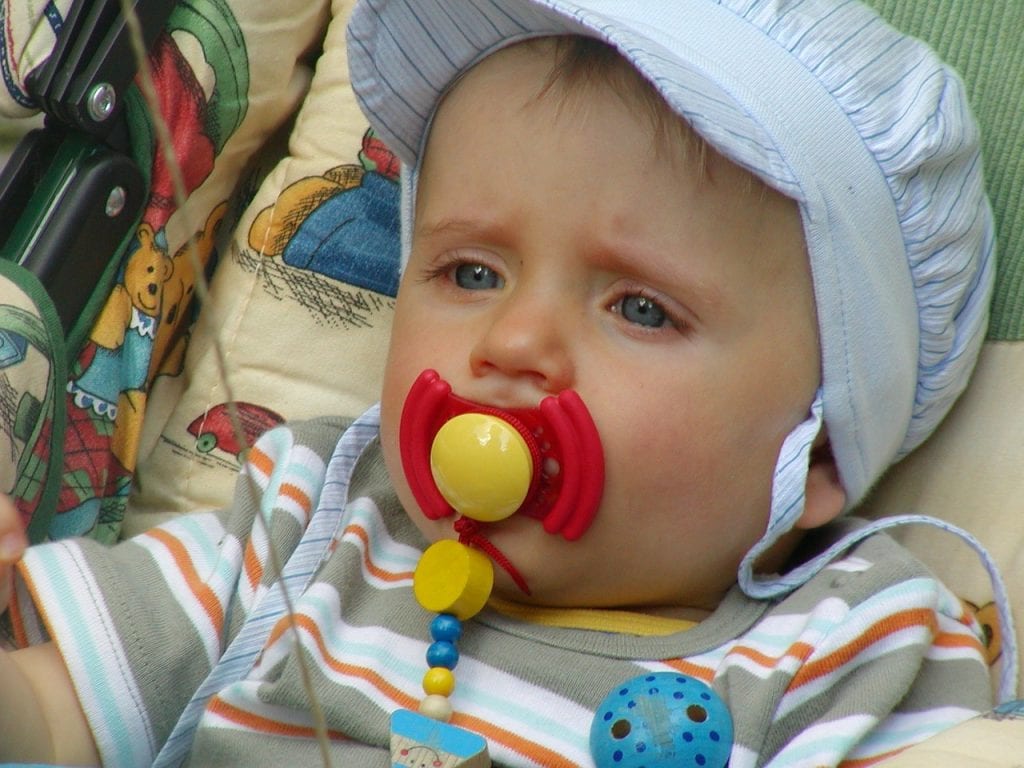
Any Drawbacks?
Pacifiers are safe for your baby, but they aren’t perfect. There are a few downsides to using a pacifier, which you should definitely consider. Here are a few of them.
Teeth Problems
If the baby uses the pacifier for too long, their mouth and teeth shape may change. This especially applies if the baby still uses the pacifier when they’re a toddler when their teeth are starting to develop. For a newborn, a pacifier is perfectly fine, but after a certain age, you may want to wean them off it.
Possible Ear Infections
Your baby can possibly get an ear infection if they use a pacifier. Now, how does a pacifier cause an ear infection? It may possibly be due to the changing ear pressure that happens when a baby sucks on the pacifier. Not to mention the germs on the pacifier.
One way you can prevent this is to wash the pacifier every once in a while and make sure that the baby is using the pacifier just for naps and not for all-day use.
Weight Gain?
It’s possible that pacifier use may lead to weight gain. After four months, there is a 10 percent chance the baby may be overweight, and 20 percent after the age of two. The science of this one is still out there. There is a correlation between pacifier babies and being overweight, but correlation does not equal causation. One theory is that the baby has more control when they are nursing.
They Can Get Dependent
Finally, a pacifier is like a drug to some babies. When a pacifier falls out, they are immediately crying and going into a fit. For parents, it can be a challenge to wean the baby off a pacifier without causing sleep deprivation for everyone involved.
It’s important to start weaning early. Some parents will just take the cold turkey approach and deal with it. The message is that you may want to make sure they aren’t taking it too much.
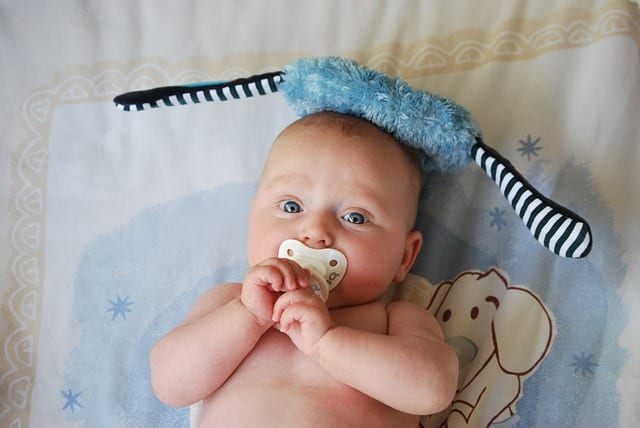
Other Ways To Ensure Pacifier Safety
Now that you know the pros and cons, here are some ways to make sure your baby is having the safest pacifier experience possible.
Have a pacifier that is BPA-free
Make sure the pacifier has no parts that can fall off. Get a one-piece pacifier.
We can’t stress this enough. Make sure the pacifier is appropriate for your child’s age. You don’t want it to be too big or too small. The shield should go over the baby’s mouth and have ventilation to keep the experience as good as possible.
Don’t attach the pacifier to anything. While you may think it’s convenient, it’s possible the strap you use to attach it can choke the baby.
Replace the pacifier every so often. For example, if you see any deterioration or discoloring, time to get a new one.
Put it in the baby’s mouth gently. If they don’t seem interested, don’t force it. Let the baby try it, and remember that not all babies like it.
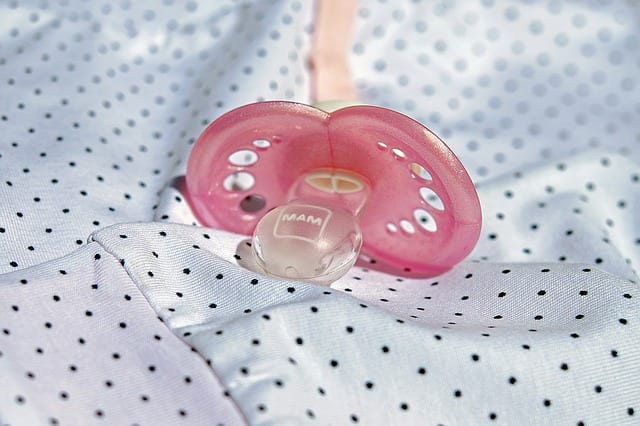
Newborns Sleeping With Pacifiers Conclusion
A pacifier for your newborn is safe and can help them sleep at night, among other benefits. With that said, it’s important that you make sure that you’re falling all the safety precautions, and you don’t let your baby use it for too long.
FAQs On Newborns Sleeping With Pacifiers
Is it okay for a newborn to sleep with a pacifier?
Yes. Newborns sleeping with pacifiers are somehow acceptable. That is because it helps protect your baby from SIDS and suffocation during sleep.
Can I give my 2-day old a pacifier?
At least try to wait to offer a pacifier until your baby is 3 to 4 weeks old if you’re breast-feeding. Or at least you’ve settled into an effective nursing routine.
Can a newborn choke on a pacifier?
Yes. While the pacifier is in the baby’s mouth, the pieces may cause lacerations, or it can lead to choking.
What are the side effects of a pacifier?
Newborns sleeping with pacifiers for an extended period can cause problems. These may include the abnormal growth of the mouth, changes in the shape of the roof of the mouth, and misalignment of the infant’s teeth.
Can you leave a pacifier in a baby’s mouth while sleeping?
Study shows that pacifiers may help reduce the risk of SIDS. Plus, it helps to keep the baby’s airway open. However, always be cautious in leaving it behind for an extended period.
Do pacifiers help with reflux?
Pacifiers help with reflux because it stimulates the flow of saliva down the esophagus.
Do pacifiers cause Overbites?
Yes, it can cause a severe overbite.
How often should I sterilize pacifiers?
It would be best if you were sterilizing pacifiers for under-6-month-old babies before each use. Then clean it with hot, soapy water before each use for children older than six months.
Do pacifiers affect speech?
Pacifiers are meant to satisfy an infant’s intense sucking needs. It does not delay or avoid nurturing a child’s speech development.
Do pacifiers cause permanent damage?
No. It does not inherently cause dental issues in newborns sleeping with pacifiers. However, prolonged use of it when the baby teeth start coming in may run the risk of oral infection and abnormal development (check here also).
When should a child no longer use a pacifier?
Most pediatric dentists and experts recommend limiting pacifier time once a child is 2-years old. And when the child reached the age of 4, it should be eliminated.
Do pacifier sizes matter?
Remember to pick a pacifier that fits your child’s age. That is because each brand’s sizing will differ depending on shape and material.
Do pacifiers help with teething pain?
A traditional teething pacifier is designed to reduce their teething pain for infants. Pacifiers massage the gums and allow simple mouth exercise for babies as well.
Last Updated on January 31, 2023 by Rejie Salazar
DISCLAIMER (IMPORTANT): This information (including all text, images, audio, or other formats on FamilyHype.com) is not intended to be a substitute for informed professional advice, diagnosis, endorsement or treatment. You should not take any action or avoid taking action without consulting a qualified professional. Always seek the advice of your physician or other qualified health provider with any questions about medical conditions. Do not disregard professional medical advice or delay seeking advice or treatment because of something you have read here a FamilyHype.com.